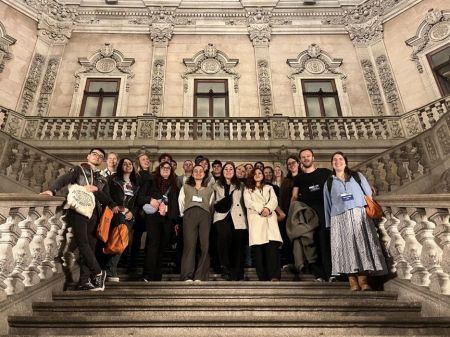We are pleased to share news of a new book relevant to…
Call for papers and presenters - 2021 International Cooperative Governance Symposium

International Co-operative Governance Symposium: June 17-19, 2021
Hosted at Saint Mary’s University by the International Centre for Co-operative Management in Halifax, Nova Scotia, Canada
** A discussion on format (in-person, virtual, or hybrid) will be made in late 2020 **
Note: The Canadian co-operative sector congress/conference is June 15-17, 2021 in Halifax – hosted and organized by Co-operatives and Mutuals Canada (CMC). The International Co-operative Governance Symposium and the CMC Congress will be coordinated to encourage participation in both events. ICCM is an engaged Associate Member of CMC and member of CMC’s Full Member (the Canadian Association for Studies in Cooperation).
About the Symposium
This International Co-operative Governance Symposium is an interactive and participatory gathering of governance professionals, experts, and researchers from various countries. This is not a large, “talking head” style conference as most attendees will be direct contributors to at least one of the sessions during the Symposium. You will engage deeply throughout and during plenary, breakout sessions, collaborative workshop-style sessions, and socializing opportunities.
Consider these few days as an opportunity to think deeply about governance characteristics, structures, and process that are fit for co-operatives. Learn from each other about new and different frameworks that focus on the people-centred, democratic, and jointly-owned nature of co-operatives with the objective of maintaining and enhancing co-operative health.
The International Centre for Cooperative Management (ICCM) hosted a symposium on governance in 2013 and since then we have been engaged in various initiatives, including an ICA report on Cooperative Governance Fit to Build Resilience in the Face of Complexity. Presently, ICCM is collaborating on a research project through 2022 on cooperative governance with colleagues at the Katholieke Universiteit Leuven (KU Leuven) and with funding support from FWO Belgium (SBO project S006019N).
Symposium context
Governance in any type of organization is not a “one size fits all”. The best cooperative governance evolves and is dependent on situation - cooperative type, culture, country, sector, economic, and other factors. However, the best governance in cooperatives is understood in the context of the cooperative purpose and enterprise model. Whether and how this is being done is central to this Symposium as well as our multi-year cooperative governance initiative.
Steering the organization according to the vision of its members, a governance system will include structures, processes, and their dynamic interplay.
- a. Governance structures will be impacted by the organization’s purpose, and the nature of members’ relationship with the cooperative.
- b. Processes are democratic, but situation dependent and not uniform.
- c. Dynamics of organizational change, its adaptation and evolution, are influenced by external and internal factors influencing members’ evolving needs and goals
The cooperative enterprise is people-centred; jointly owned and controlled; and democratic.2 Following from that, all cooperatives subscribe to democratic governance, although practices and forms of democracy will be context-dependent.
What does cooperative governance need to accomplish?
With the definition of the cooperative enterprise by the International Cooperative Alliance’s (ICA) Statement on the Cooperative Identity as the starting point, the following assumptions help clarify the role of cooperative governance systems. Building on the findings of our 2013 International Cooperative Governance Symposium,3 cooperative governance needs to:
- a. Secure democratic (member) control;
- b. Identify and pursue the cooperative purpose;
- c. Create and maintain cooperative culture (values), built on reciprocity, solidarity and trust;
- d. Continue to meet member needs (the ‘service’ role of the cooperative)4; and,
- e. Secure long-term viability as a cooperative (vision focused on future generations of members).
Symposium Topics
Keeping in mind the context described above, make a submission for a Symposium session:
- Contemporary frameworks for cooperative governance with due consideration of situational dimensions (sector, type, external environment, etc.).
- The integration of cooperative governance systems with the enterprise model (as people-centred; jointly owned and controlled; and democratic).
- Governance system (structures, processes, dynamics) in cooperatives focused on its fit with the enterprise model vs. leaning into conventional corporate governance approaches designed for investor-owned corporate models.
- Theory combined with practice. Examples of successful cooperatives that experiment with and/or fully embrace core aspects of cooperative governance, in particular those that demonstrate the participatory, people-centred, and democratic nature of the enterprise model.
- Governance in the context of humanistic economics and management theories as more appropriate for cooperative enterprises than the alternative assumptions underlying the agency theory.5
- Contingent (situational) variables and the impacts on governance systems. Variables may include: membership type, purpose of membership, inclusion of non-member stakeholders, size (by membership), stage in the lifecycle, primary purpose of the enterprise, culture, competition, regulations.
- Issues specific to the cooperative type, and governance structures that address those issues (e.g. voting rights by volume of patronage in producer cooperatives; conflict resolution mechanisms in worker cooperatives; network governance and subsidiarity in 2nd and 3rd tier cooperatives; etc.).
- Challenges of implementing cooperative governance practices, and how these are addressed.
- Governance practices connected to the long-term sustainability of cooperatives and their ability to create value for (current and future) members and society.
- Implementing change in cooperative governance – what are the triggers; how does change happen; how are new needs assessed.
Submission
Submit the following to Sonja Novkovic (snovkovic@smu.ca).
Deadline: November 1, 2020
- Your name, role, institution, contact information
- Brief bio describing the scope of your engagement with governance and the cooperative movement (types, sectors, countries)
- 250-500 word description of your proposed topic, indicating alignment with symposium themes
- Preferred format (panel, collaborative workshop, presentation, etc.), and your suggestions for creating an engaging and interactive session.
Symposium Outputs
- Symposium Report
- Edited book on humanistic governance in democratic organizations (invited submissions; Palgrave McMillan publisher)
- ICCM Working Papers
- Academic Articles6
- Case Studies
Reasons to Get Involved
- Share your knowledge and expertise while deepening your global network
- Explore current practices or new ways of approaching cooperative governance
- Partner with other like-minded practitioners and researchers
- Advance theory and governance practice in cooperatives
- Contribute to the development of case studies, working papers, research reports, papers, and books.
See also https://www.smu.ca/academics/sobey/second-international-governance-symposium.html




